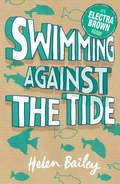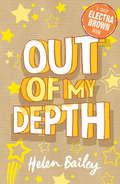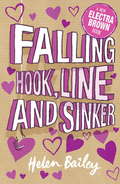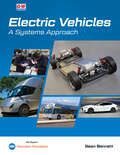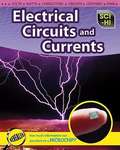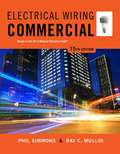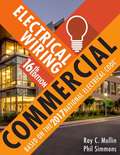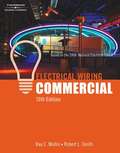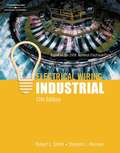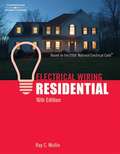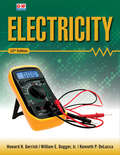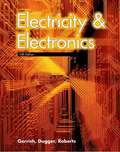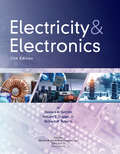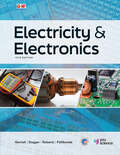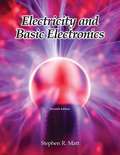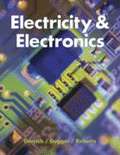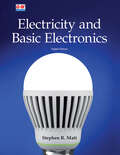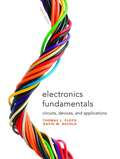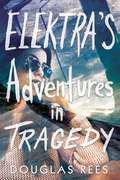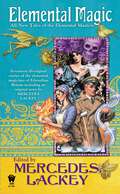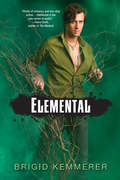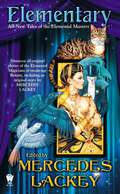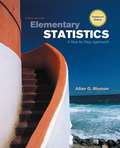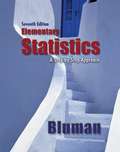- Table View
- List View
Electra Brown: Book Three
by Helen BaileyEveryone's got major lurve-action except Electra. She hates swimming against the tide; she'd rather go with the flow. She should be planning how to hook a hunk, but all she can think is, What's for lunch?She can be VERY shallow.
Electra Brown: Book Two
by Helen BaileyElectra's totally out of her depth. Everyone's giving her the third degree! Freak Boy's dad wants to know whether he's being bullied. Sorrel's interrogating Electra about Lucy's private life. Even her dad is cross-examining her about her mum's love-life, over his Deep Pan Super Supreme. And all Electra can think is, How far can you get a piece of melted cheese to stretch without it breaking? Welcome to the crazy world of Electra Brown.
Electra Brown: Crazy World of Electra Brown 5
by Helen BaileyElectra's head over high heels in lurve!She's fallen hook, line and sinker for a testosterone-packed hunk. He's cute, he's cool and he's been expelled from school. What more could a girl want?There's only one minor problemo: she already has a boyfriend. She should do what's right and walk away. But will she? As if!
Electric Vehicles: A Systems Approach
by Sean BennettElectric Vehicles: A Systems Approach provides the foundational knowledge technicians need to safely service all types of electric vehicles (EVs). With a strong emphasis on high-voltage safety, this textbook navigates the complexities of high-voltage drive trains using an easy-to-understand, approachable writing style and engaging visuals. Using real-world examples and illustrations, the text provides an understanding of ICE-hybrid, battery-electric, and fuel cell operation. Coverage includes CAN Bus Communication Systems and telematics in the context of electric vehicles. It incorporates all forms of electric vehicle transportation, including passenger vehicles, construction vehicles, and commercial vehicles. Author Sean Bennett addresses electric vehicles from a technician's perspective, providing them with a strong background in EV technology and giving them an incredible opportunity for rapid advancement in the automobile repair industry.
Electrical Circuits and Currents
by Barbara A. SomervillWhat is St. Elmo's Fire? How does a steam turbine generate electricity? Which scientist developed the first battery? Electrical Circuits and Currents takes a look at how electricity works, and the forms that it takes. You will learn about electrical charges, series and parallel circuits, and materials that conduct electricity. You will even discover how to create your own schematic diagrams of electrical circuits! Wire it up and enter the always fascinating world of electrical circuits and currents! Sci-Hi is a visually stimulating series that takes learning science core curriculum to a whole new level! Each title in the series explores an area of life, physical, or earth science in a way that is both engaging and comprehensive. Topics include everything from chemical reactions to cell function and specialization. Features of the series include high-interest spreads, fantastic photos and artwork, science activities and projects, quizzes, reviews, timelines, and two or more pages of glossary words and further information. Book jacket.
Electrical Wiring Commercial
by Ray C. Mullin Phil SimmonsOffering the most current coverage available, ELECTRICAL WIRING COMMERCIAL, 15e is completely revised and up to date with the 2014 National Electrical Code. Extremely reader friendly, the text has long been popular with learners. Vibrant, full-color illustrations and photographs help you easily grasp difficult concepts. The new edition continues the book's emphasis on newer green technologies and developments within electrical design and installation, including coverage of EV stations in commercial settings. It also offers expansive coverage of safety in the workplace.
Electrical Wiring Commercial
by Ray C. Mullin Phil SimmonsCompletely revised and up to date with the 2017 National Electrical Code#65533;, ELECTRICAL WIRING COMMERCIAL, Sixteenth Edition, offers the most current coverage available. This reader-friendly text has long been trusted by instructors and popular with students. Known for its vibrant, full-color illustrations and photographs, the text bring even difficult concepts to life and makes complex material easier to understand. In addition to updates based on 2017 NEC#65533;, the Sixteenth Edition features increased emphasis on green technologies, new developments in electrical design and installation, and safety in the workplace, providing ample coverage of topics you'll likely encounter as a working professional in this dynamic field.
Electrical Wiring Commercial
by Ray C. Mullin Robert L. SmithThis introduction to basic wiring centers on the planning of a typical commercial electrical installation, demonstrating how the load requirements are converted into branch-circuit, then into feeders, and finally into the building's main electrical service. Ten plan sheets are provided. The eleventh edition of the textbook adds a comparison of armored cable to metal clad cable. Annotation c. Book News, Inc. , Portland, OR (booknews. com)
Electrical Wiring Industrial
by Robert L. Smith Stephen L. HermanUpdated to reference the 2008 National Electrical Code, this edition of Electrical Wiring Industrial guides readers step-by-step through the wiring of an entire industrial building, making this an ideal resource for anyone who will work in the industrial electricity industry. With a practical, straightforward approach, the book begins by covering the tasks and responsibilities that face today's professional industrial electricians, including: installation of electrical service, power and lighting; special new construction systems; changeovers from old systems; planning for growth and increased capacity; and periodic maintenance procedures. Specific references to the 2008 National Electrical Code throughout the book shows readers how to incorporate codes and principles into everyday practice and procedures. A complete set of industrial building plans is also included, offering opportunities for hands-on practice in interpreting and applying Code requirements to sitework, feeder bus systems, panelboards, fiber optics, harmonics, hazardous locations, and more.
Electrical Wiring: Residential
by Ray C. MullinThis text covers the rules of the National Electric Code (NEC) as they apply to the installation of wiring in a house. The first seven chapters cover basic electrical code requirements. Topics include, for example, safety when working with electricity, construction symbols, connecting switches and receptacles, ground-fault circuit-interrupters and surge suppressers. The remainder of the text is devoted to a description of the wiring of an actual house. Annotation c. Book News, Inc. , Portland, OR (booknews. com)
Electricity
by Howard H. Gerrish William E. Dugger Kenneth P. DeLuccaElectricity supports introductory or short courses that familiarize students with basic principles and applications for this form of energy. Using easy-to-understand language, this text provides a practical and concise introduction to sources of electricity, circuit types, electric motors, measuring instruments, generators, transformers, inductance, capacitance, solid-state devices, wireless devices, and solder/desoldering. Nine projects are included to provide students with hands-on learning opportunities related to the concepts learned throughout the text.
Electricity & Electronics
by Richard M. Roberts Howard H. Gerrish William E. Dugger Jr.Textbook on the fundamentals for technical school students. No bibliography.
Electricity & Electronics
by Richard M. Roberts Howard H. Gerrish William E. Dugger Mahesh K. PallikondaElectricity & Electronics provides comprehensive coverage of basic concepts and applications in the study of electronics and electrical technology. As students learn the foundational concepts, they also begin developing the skills and knowledge needed to perform laboratory activities. The text correlates to the certifications offered by the Electronics Technicians Association (ETA). Topics include circuitry, motor, generators, power distribution systems, and advanced systems. A chapter covering careers and entrepreneurship make learning relevant to students exploring or preparing for this career.
Electricity And Basic Electronics
by Stephen R. MattElectricity and Basic Electronics teaches basic theory and fundamentals and is a starting point for careers in electronics. The text is clearly written and highly illustrated, making it easy for beginners to understand. Numerous examples walk students step-by-step through circuit analysis where applicable. The Practical Application and Project feature covers topics such as breadboarding, soldering, and reading voltage on an oscilloscope. There are 16 practical applications in all. The Project features, 28 in all, allow students to build items such as a continuity tester, blown fuse indicator, and power supply. Projects typically include a schematic, a picture of the finished product, and a procedure for assembling the project. A new Math Focus feature provides students with a quick review of the basic math skills they need to understand the topic at hand. Math topics covered are exponents, scientific notation, metric and electrical prefixes, order of operations, algebraic equations, adding fractions, rations and proportions, and square roots. A new chapter called “Energy Conservation” covers ways to conserve energy and alternative forms of energy. Geothermal systems, photovoltaics, and wind turbines are just some of the topics covered.
Electricity And Electronics
by Richard M. Roberts Howard H. Gerrish William DuggerTextbook on the fundamentals for technical school students. No bibliography.
Electricity and Basic Electronics
by Stephen R. MattElectricity and Basic Electronics teaches basic theory and fundamentals and is a starting point for careers in electronics. The text is clearly written and highly illustrated, making it easy for beginners to understand. Numerous examples walk students step-by-step through circuit analysis where applicable. <p><p>The Practical Application features cover topics such as breadboarding, soldering, and reading voltage on an oscilloscope. The Project features allow students to build items such as a continuity tester, blown fuse indicator, and power supply. Math Focus features provide students with a quick review of the basic math skills they need to understand the topic at hand. Math topics covered are exponents, scientific notation, metric and electrical prefixes, order of operations, algebraic equations, adding fractions, ratios and proportions, and square roots. A chapter called “Energy Conservation” covers ways to conserve energy and alternative forms of energy.
Electronics Fundamentals: Circuits, Devices and Applications (Eighth Edition)
by David M. Buchla Thomas L. FloydThis renowned book offers a comprehensive yet practical exploration of basic electrical and electronic concepts, hands-on applications, and troubleshooting. Written in a clear and accessible narrative, the Seventh Edition focuses on fundamental principles and their applications to solving real circuit analysis problems, and devotes six chapters to examining electronic devices.
Elektra's Adventures in Tragedy
by Douglas ReesFunny and smart with all the angst and sass of adolescence and a colorful cast of characters, this is a refreshing contemporary coming-of-age YA about one Greek-American girl's odyssey home. Sixteen-year-old Elektra Kamenides is well on her way to becoming a proper southern belle in the small Mississippi college town she calls home. That is, until her mother decides to uproot her and her kid sister Thalia and start over in California. They leave behind Elektra's father--a professor and leading expert on Greek mythology, and Elektra can't understand why. For her, life is tragedy, and all signs point to her family being cursed. Their journey ends in Guadalupe Slough, a community of old Chicano families and oddball drifters sandwiched between San José and the southern shores of San Francisco Bay. The houseboat that her mother has bought, sight unseen, is really just an ancient trailer parked on a barge and sunk into a mudflat. What would Odysseus do? Elektra asks herself. Determined to get back to Mississippi at all costs, she'll beg, lie, and steal to get there. But things are not always what they seem, and home is wherever you decide to make it.
Elemental Magic: All-New Tales of the Elemental Masters (Elemental Masters)
by Mercedes LackeyAmong Mercedes Lackey’s many novels, few are as critically acclaimed and beloved as those about the Elemental Masters. The novels in this series are loosely based on classic fairy tales, and take place in a fantasy version of turn-of-the-century London, where magic is real and Elemental Masters control the powers of Fire, Water, Air, and Earth. Now other authors join Mercedes Lackey to add their own special touches to this delightful alternate history, in a world where magic is always just around the corner. . . .
Elemental: An Elementals Novella #0. 5 (Elemental #4)
by Brigid KemmererEarth, Fire, Air, Water – they are more than you dream.As an air Elemental, 17-year-old Emily Morgan doesn't have much power. That's okay--she knows what happens to kids who do. Like Michael Merrick. He's an earth Elemental, one with enough power to level cities. Which makes him sexy, dangerous, and completely off limits. At least according to Emily's family. But her summer job puts her in close contact with Michael, and neither of them can help the attraction they feel. When forces of nature like theirs collide, one misstep could get someone killed. Because Emily's family doesn't just want her to stay away from him. They want him dead. Praise for Brigid Kemmerer and The Elemental Series"Magic, suspense, and enough twists to keep you reading until sunrise. An incredible start to the series!" --Award winning author Erica O'Rourke"Overflowing with action, snappy dialog, and hot guys--The Elemental Series will take your breath away." --Kim Harrington, author of Clarity"Plenty of romance and non-stop action. . ..Elemental is the new series to watch." --Inara Scott, author of The Marked12,000 Words
Elementary (Elemental Masters)
by Mercedes LackeyIn March 1987, Mercedes Lackey, a young author from Oklahoma, published her first novel, Arrows of the Queen. No one could have envisioned that this modest book would be the beginning of a fantasy career that would span decades and more than a hundred novels, with no signs of slowing yet. And among Ms. Lackey's many novels, few are as critically-acclaimed and beloved as those of the Elemental Masters. The novels in this series are loosely based on classic fairy tales, and take place in a fantasy version of turn-of-the-century London, where magic is real and Elemental Masters control the powers of Fire, Water, Air and Earth. Now the voices of other authors join Mercedes Lackey to add their own special touches to this delightful alternate history, in a world where magic is always just around the corner. . . .
Elementary Statistics, A Step by Step Approach (Sixth Edition)
by Allan G. BlumanNIMAC-sourced textbook
Elementary Statistics: A Step by Step Approach
by Allan G. BlumanElementary Statistics: A Brief Version, 4th Edition is a shorter version of Allan Bluman's popular text Elementary Statistics: A Step by Step Approach, 6th edition. This softcover edition includes all the features of the longer book, but is designed for a course in which the time available limits the number of topics covered. The book is written for general beginning statistics courses with a basic algebra prerequisite. The book use a non-theoretical approach, explaining concepts intuitively and teaching problem solving through worked examples step-by-step.
